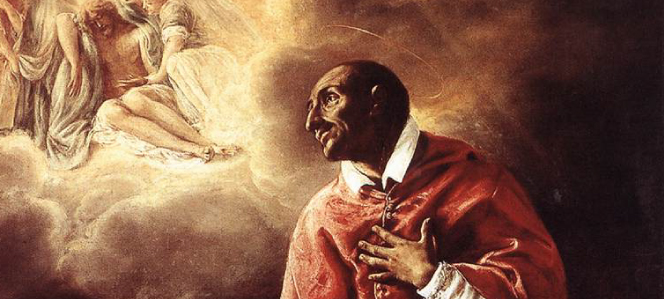Today is the Feast Day of St. Charles Borromeo. St. Charles was a prominent figure in the Church during the time of the Council of Trent (1545-1563), a period of great reform within the Church that was motivated both by internal impetus and as a response to the Protestant Reformation. After the council, Charles took up residence in the city of Milan to serve as Cardinal in the Archdiocese.
Charles was born of nobility, a member of the powerful Borromeo and Medici families of 16th Century Milan. His uncle, in fact, was Cardinal de Medici, who was elected pope in 1559 as Pius IV. Because of this royal pedigree, St. Charles’ appointed position as Cardinal of Milan did not preclude his participation in a life of extravagance. However, in response to the reforms of Trent, Charles committed himself instead to a life of voluntary poverty and ascetic elimination of temptations in order to more fully embody the Councils’ great reforms and decrees. His attitude is evident in his advice to his brother priests and bishops at that time, “Be sure that you first preach by the way you live. If you do not, people will notice that you say one thing, but live otherwise, and your words will bring only cynical laughter and a derisive shake of the head.”
St. Charles’ story of sanctity and his great “yes” to the call of Christ involves elements of the classic tale of heroism that we see in the lives of St. Francis of Assisi and St. Katharine Drexel: a voluntary rejection of great privilege, wealth, and worldly notoriety in order to serve God with single-minded vision; a streamlined vision less encumbered by material and distractions. Again, from St. Charles: “When we remove all obstacles to his presence he will come, at any hour and moment, to dwell spiritually in our hearts.”
But, what remains telling in St. Charles’ path to holiness is not the boldness of his initial response, but the steady realignment and constant recommitment to relationship beyond the heroism of foregoing of his earthly possessions and his claim to worldly notoriety. This, truly, is the heart of sainthood; this is it— over and over again we witness it, time after time we praise it, but day after day we somehow dread it: the commitment to daily-ness of love.
I find myself pondering this theme. It is found in C.S. Lewis’ law of undulation and his descriptive warning of the inevitability of spiritual peaks and troughs; in the Old Testament prophets’ pleas for the people Israel to remember who they are and honor the covenant even as they wander through a physical and spiritual desert; in movies about love that give legitimacy to “falling out” of commitment when the feeling fades. These examples justify an abandonment of vocation after the thrill of what the Ignatian spiritual exercises refer to as “first fervor” has subsided.
Fervor is an invaluable catalyst, but if stopped short at impassioned feeling, it takes on the appearance of the character in Christ’s parable who scatters seed on shallow soil and then, once the seed blows away in the wind, figures it was a silly idea to plant in the first place. Instead, this fervor should be appreciated for the ardent impetus it offers, nourished by grace and ongoing prayer (the fertile soil of the parable), and allowed to take deep and daily root in Christ.
St. Charles Borromeo truly said it best: “The tiniest fire of divine love has been lit in you. Then do not rush to make a parade of it. Do not take it out into the icy blast. Keep the furnace door shut on it so that it does not die out. Keep your mind fixed on God.”
St. Charles Borromeo, pray for us!
